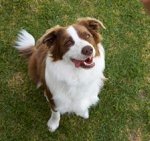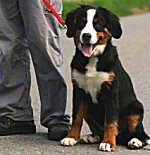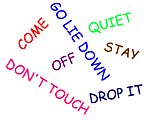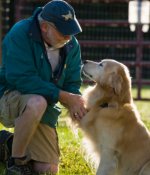Bichon Frise: What's Good About 'Em, What's Bad About 'Em
Bichon Frise temperament, personality, training, behavior, pros and cons, advice, and information, by Michele Welton, Dog Trainer, Behavioral Consultant, Author of 15 Dog Books
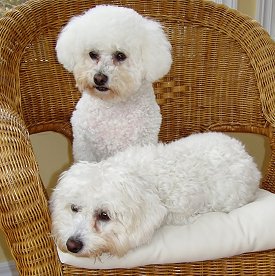
The AKC Standard calls the Bichon Frise "a white powder puff of a dog whose merry temperament is evidenced by his plumed tail carried jauntily over the back and his dark-eyed inquisitive expression."
The Bichon Frise is pretty easy to live with. This cheerful, pleasant house dog enjoys playing games, snuggling into laps and pillows, and perching on the back of the sofa so he can peer out the window (and often BARK.... but we'll get to that!).
Exercise needs are easy to meet: a daily walk or two, plus a small yard in which to trot around and stretch his legs.
Bichons are peaceful with everyone, including other pets. There is timidity in some lines, so early socialization is important to develop their confidence.
Though he does have an independent streak, the Bichon Frise is not a dominant dog. He responds well to training, though he prefers learning tricks to formal obedience and is especially bright-eyed when food treats are offered as rewards. Harshness only makes him spiteful.
The three most common behavioral issues with the Bichon Frise are:
- Housebreaking. Bichons are usually difficult/slow to housebreak.
- Separation anxiety. Most Bichons are so sociable and dependent on human companionship that they don't do well when left for long periods of time. Anxiety and frustration can lead to destructive chewing.
- Barking. Some Bichons are very barky, and some have a high-pitched bark that can set your teeth on edge.
If you want a dog who...
- Is small but sturdy
- Is playful, but doesn't need much outdoor exercise (though he enjoys it!)
- Has a curly coat that doesn't shed (one of the best breeds for allergy sufferers)
- Makes an alert watchdog, but is not aggressive
- Is good with other pets
A Bichon Frise may be right for you.
If you don't want to deal with...
- Notorious housebreaking difficulties
- "Separation anxiety" (destructiveness and barking) when left alone too much
- Shyness in some lines, or when not socialized enough
- Frequent clipping of the curly coat
- Potential for excessive barking
A Bichon Frise may not be right for you.
 |
Dog Breed Traits – Which Traits Are Right For You? In this brand new series, I'll help you decide which dog breed traits would best suit you and your family, your home and yard, and your lifestyle, so you can choose the best dog breed for your family. |
Keep in mind that the inheritance of temperament is less predictable than the inheritance of physical traits such as size or shedding. Temperament and behavior are also shaped by raising and training.
FREE eBooks by Michele Welton
![]() "Respect Training for Puppies" and "Teach Your Dog 100 English Words" are free step by step guides to teaching your pup to be calm and well-behaved.
"Respect Training for Puppies" and "Teach Your Dog 100 English Words" are free step by step guides to teaching your pup to be calm and well-behaved.
![]() "11 Things You Must Do Right To Keep Your Dog Healthy and Happy" is a free guide to keeping your dog mentally, physically, and emotionally happy and healthy so you can enjoy a longer lifetime of companionship.
"11 Things You Must Do Right To Keep Your Dog Healthy and Happy" is a free guide to keeping your dog mentally, physically, and emotionally happy and healthy so you can enjoy a longer lifetime of companionship.

- You can avoid some negative traits by choosing an ADULT dog from an animal shelter or rescue group. With an adult dog, you can easily see what you're getting, and plenty of adult Bichons have already proven themselves not to have negative characteristics.
- If you want a puppy, you can avoid some negative traits by choosing the right breeder and the right puppy.
More traits and characteristics of the Bichon Frise
If I was considering a Bichon Frise, I would be most concerned about...
- Grooming. Bichon Frise coat care is a major responsibility. They require weekly brushing and combing, and also clipping and trimming every 6-8 weeks. Otherwise their coat keeps growing and turns into a matted mass.
Just don't expect your pet Bichon Frise to look like the "puff-ball" show dogs you've probably seen on the Westiminster Kennel Club show on television. That particular look takes hours of work by experienced show groomers, and then they're reluctant to let their dogs play outside in the yard. You and your dog don't want that!Instead, clip your Bichon's coat short so that brushing and combing is minimized. Then he will look like an adorable puppy throughout his life, and he can play in the dirt like every other dog.
- Housebreaking. As a behavioral consultant, I put the Bichon Frise on my Top 10 List of "Hardest Breeds To Housebreak." Consistent crate training is mandatory. Sometimes a doggy door is necessary so the dog can go out whenever he needs to (though that can lead to another problem if he stays outside and barks, which Bichons enjoy doing!). You will have greater success if the potty area is COVERED, since many Bichons despise getting wet. Read more on housebreaking.
If the potential housebreaking problem sounds like a deal-breaker to you, don't give up! Consider adopting an already-housebroken adult Bichon Frise from a rescue group.
- Potential separation anxiety. More than most other breeds, the Bichon Frise needs a great deal of companionship and does not like being left alone for more than a few hours. They tend to express their unhappiness through destructive chewing and barking.
- Potential barking. Like most small dogs, the Bichon Frise is often too quick to sound the alarm at every new sight and sound. You have to be equally quick to stop your Bichon from turning into a barker. To do this successfully, you must establish the right relationship between the two of you, where you are the leader and he is the follower. In other words, you must teach your Bichon Frise to respect you. A dog who respects you will do what you say and will stop what he's doing when you tell him "No." Read more about respect training.
- Potential health problems. Many Bichons live a good long life. Unfortunately, as a breed, the Bichon Frise tends to inherit a faulty immune system which makes them susceptible to allergies. Bichons can be allergic to fleas, grass, pollen, certain shampoos, and so on. Allergies cause your Bichon Frise to scratch and chew himself into horrendous skin conditions.
Other concerns in the breed are urinary problems and bladder stones, along with loose knee joints that may require surgery, ear infections, cataracts, diabetes, heart disease. Read more about Bichon Frise Health.
My best-selling books – now available FREE on my website
 Respect Training For Puppies: 30 seconds to a calm, polite, well-behaved puppy is for puppies 2 to 18 months old. Your puppy will learn the 21 skills that all family dogs need to know. Click here to read for free.
Respect Training For Puppies: 30 seconds to a calm, polite, well-behaved puppy is for puppies 2 to 18 months old. Your puppy will learn the 21 skills that all family dogs need to know. Click here to read for free. Teach Your Dog 100 English Words is a unique Vocabulary and Respect Training Program that will teach your adult dog to listen to you and do what you say. Click here to read for free.
Teach Your Dog 100 English Words is a unique Vocabulary and Respect Training Program that will teach your adult dog to listen to you and do what you say. Click here to read for free. 11 Things You Must Do Right To Keep Your Dog Healthy and Happy helps your dog live a longer, healthier life. Get my honest advice about all 11 Things before you bring home your new puppy, because some mistakes with early health care cannot be undone. Click here to read for free.
11 Things You Must Do Right To Keep Your Dog Healthy and Happy helps your dog live a longer, healthier life. Get my honest advice about all 11 Things before you bring home your new puppy, because some mistakes with early health care cannot be undone. Click here to read for free.Related posts you might enjoy



